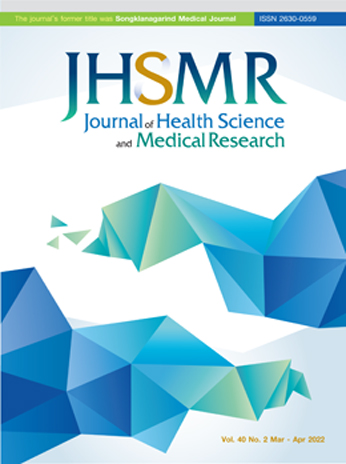Diabetic Ketoacidosis Misdiagnosed and Managed as Typhoid Ileal Perforation in a Ghanaian Child: A Case Report
DOI:
https://doi.org/10.31584/jhsmr.2021825Keywords:
diabetic ketoacidosis, laparotomy, misdiagnosis, typhoid perforationAbstract
We report on a 15-year-old Ghanaian boy, who presented to a district hospital with diabetic ketoacidosis (DKA) but was diagnosed wrongly as a small bowel perforation due to typhoid fever. He presented with weakness, poor feeding, vomiting, and severe abdominal pain. General examination revealed a lethargic, drowsy, and severely dehydrated patient. His abdomen was diffusely tender more in the right ileac fossa. Investigations including complete blood count, blood smear for malaria parasites, urinalysis, and abdominal ultrasound yielded unremarkable results. Hemoglobin level was 12.4 grams per decilitre. He was diagnosed as typhoid ileal perforation and laparotomy was done, but the bowels and all other intra-abdominal organs were found to be normal. A blood glucose test was done intraoperatively, and it found very high hyperglycaemia. This led to the suspicion of DKA, which was confirmed through urine dipstick testing for high urine ketones and a high glycated hemoglobin (HbA1C) test result. He was then treated for DKA, which resolved on the second day of admission, but the surgical wound healed after twelve days.
Our account emphasizes the need for testing for blood glucose in critically ill children and adolescents with suspected severe infections or acute medical conditions that require admission or surgical intervention. This owes to the fact that the clinical features of undiagnosed diabetes, especially if it progresses to DKA, are similar to those of infections and disorders managed via surgical treatment, which are rather more common in Ghana and Africa.
References
Atkilt HS, Turago MG, Tegegne BS. Clinical Characteristics of Diabetic Ketoacidosis in Children with Newly Diagnosed Type 1 Diabetes in Addis Ababa, Ethiopia: A Cross-Sectional Study. Plos One 2017;12:e0169666
Perilli G, Saraceni C, Daniels MN, Ahmad A. Diabetic Ketoacidosis: A Review and Update. Curr Emerg Hosp Med Rep 2013;1:10-7.
Murunga AN, Owira PM. Diabetic ketoacidosis: an overlooked child killer in sub-Saharan Africa? Trop Med Int Health 2013; 18:1293-422.
Sundaram PCB, Day E, Kir JMW. Delayed diagnosis in type 1 diabetes mellitus. Arch Child 2009;94:151-2.
Kear C, Fisher T, Westwood E, Sachdev P, Denvi L. Delayed Diagnosis of Type 1 Diabetes Mellitus in Children. Arch Child 2016;101(Suppl 1):A103-4.
Rabkin M, Melaku Z, Bruce K, Reja A, Koler A, Tadesse Y, Kamiru HN, Sibanyoni LT and El-Sadr W. Strengthening Health Systems for Chronic Care: Leveraging HIV Programs to Support Diabetes Services in Ethiopia and Swaziland. J Trop Med 2012. doi:10.1155/2012/137460.
Kratzer J. Structural barriers to coping with Type 1 Diabetes Mellitus in Ghana: Experiences of diabetic youth and their families. Ghana Med J 2012;46:39-45.
Shields BM, Peters JL, Cooper C, Powell RJ, Knight BA, Hyde C, Hattersley AT. Identifying clinical criteria to predict Type 1 diabetes, as defined by absolute insulin deficiency: a systematic review protocol. BMJ Open 2012;2:1-5.
Silverstein J, Klingensmith G, Copeland K, Plotnick, Kaufman F, Laffel L, Deeb L, Grey M et al. Care of Children and Adolescents with Type 1 Diabetes. Diabetes Care 2005;28: 186-212.
Wolfsdorf J, Glaser N, Sperling MA. Diabetic Ketoacidosis in Infants, Children, and Adolescents. Diabetes Care 2006;29: 1150-9.
Misra UK, Kalita J, Prabhakar S, Chakravarty A, Kochar D, Nair PP. Cerebral malaria and bacterial meningitis. Ann Indian Acad Neurol 2011;14:S35-9.
Harris M, Clark J, Cooke N, Fletcher P, Harnden A, Mckean M, et al. British Thoracic Society Guidelines for the Management of Community Acquired Pneumonia in Childhood. Thorax 2011; 66:ii1-23.
Kuubiere CB, Mogre V, Majeed SF and Alhassan A. Typhoid intestinal perforations in Northern Ghana. Al Ameen J M Edical C Ience 2014;7:251-6.
Rwiza HT, Swai ABM, McLarty DG. Failure to diagnose diabetic ketoacidosis in Tanzania. Diabet Sci 1986;3:181-3.
Wolfsdorf J, Glaser N, Agus M, Fritsch M, Hanas R, Rewers A, Sperling MA, Codner E. ISPAD Clinical Practice Consensus Guidelines 2018: Diabetic ketoacidosis and the hyperglycaemic hyperosmolar state. Pediatric Diabetes 2018; 19 (Suppl 27):155-77
Ogle G, Middlehurst A, Silink M, Hanas R. Pocketbook for Management of Diabetes in Childhood and Adolescence in Under-resourced Country. 2nd ed. Brussels: International Diabetes Federation; 2017.
Espinoza LMC, Nichols C, Adu-Sarkodie Y. Variations of Invasive Salmonella Infections by Population Size in Asante Akim North Municipal, Ghana. Clin Infect Dis 2016;62:S17-22.
Downloads
Published
How to Cite
Issue
Section
License

This work is licensed under a Creative Commons Attribution-NonCommercial-NoDerivatives 4.0 International License.
























